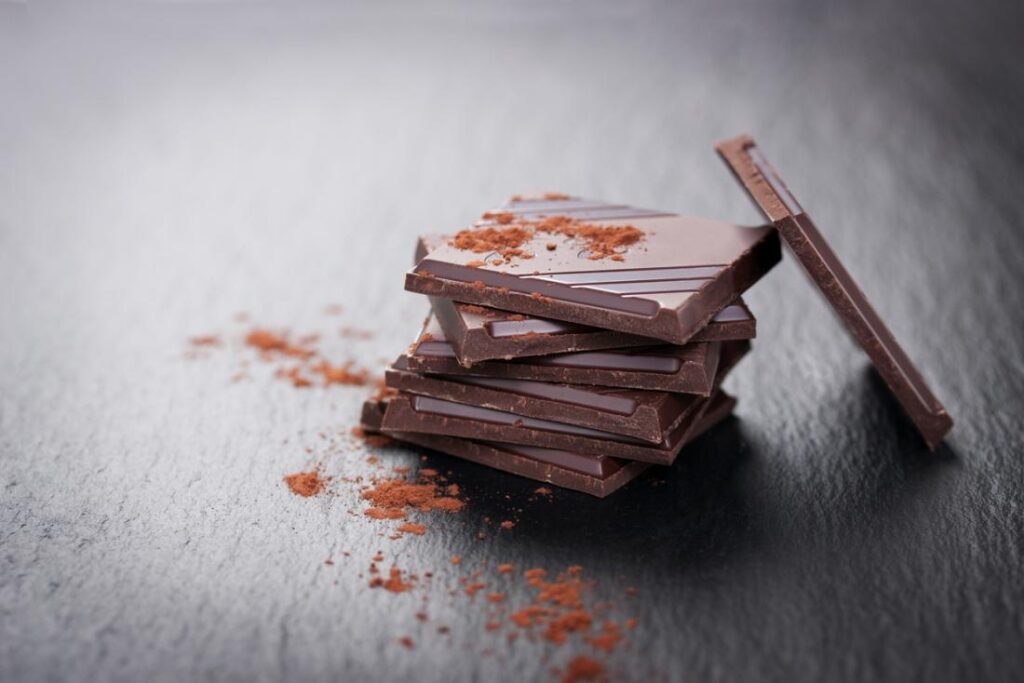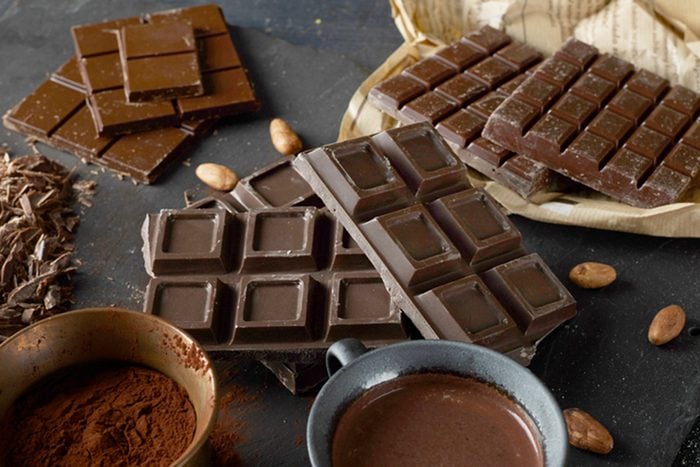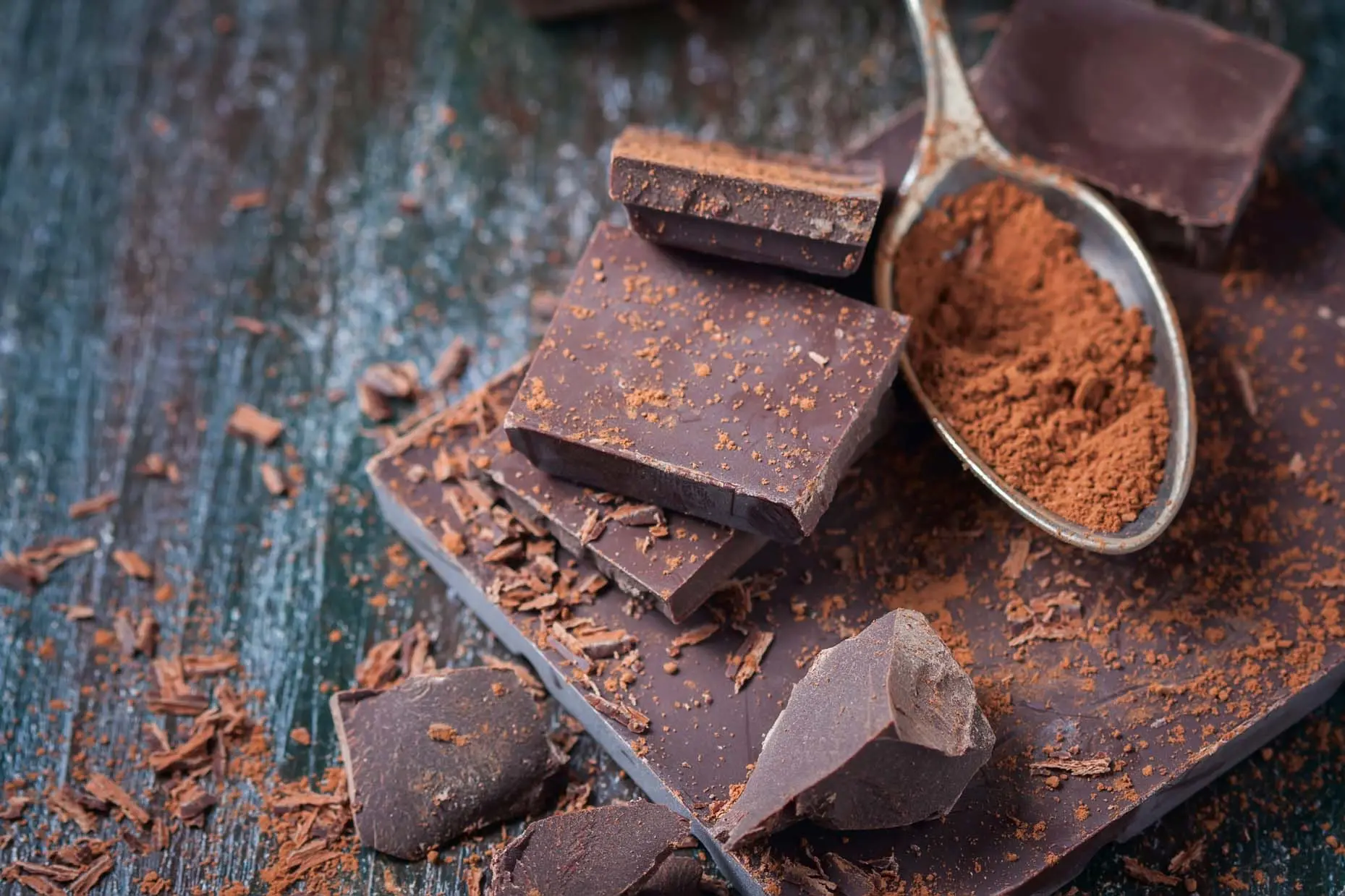Chocolate can make some people cough due to a combination of factors, including dryness, fine cocoa particles, and potential allergies or sensitivities to chocolate ingredients.
These factors can irritate the throat and trigger the cough reflex in some individuals. Here are the Reasons that might make you cough,
- Cocoa particles can irritate the throat.
- Dry chocolate can create a scratchy feeling.
- Allergies to chocolate ingredients may lead to coughing.
- Sensitivity to dairy in chocolate can trigger coughing.
- The abrasive texture of chocolate can cause throat irritation.
The Chocolate Cough Phenomenon

Have you ever experienced an unexpected coughing fit after indulging in a delicious piece of chocolate? It’s a puzzling phenomenon that many chocolate enthusiasts have encountered. The question arises, “Why does chocolate make me cough?”
This enigmatic reaction to a beloved treat sparks curiosity and prompts us to explore the intriguing science behind it.
The common experience of coughing when eating chocolate:
The experience of coughing when eating chocolate is a surprisingly common occurrence that has perplexed many individuals. It typically unfolds as follows:
Personal anecdotes or stories from others who have experienced this phenomenon:
This peculiar chocolate-induced coughing phenomenon has been the subject of anecdotal stories and personal accounts from chocolate enthusiasts worldwide. Here are a couple of examples:
The Chocolate Tasting Event: During a chocolate-tasting event, Mary, an avid chocolate lover, was excited to sample various high-quality chocolates. However, with each bite, she found herself coughing uncontrollably.
She noticed that this happened consistently, regardless of the type of chocolate she tried, and she couldn’t figure out why.
A Family’s Quirky Tradition: In the Johnson family, a unique tradition emerged over the years. Whenever they enjoyed chocolate desserts together, they playfully anticipated the inevitable “chocolate coughing symphony.”
Each family member took their turn coughing, attributing it to the chocolate’s peculiar power.
Potential Culprits in Chocolate
Components of chocolate that may trigger coughing:
To unravel the mystery of why chocolate can induce coughing, it’s essential to examine the various components that make up this beloved treat. Several factors within chocolate could potentially contribute to this phenomenon:
Cocoa Particles: Tiny cocoa particles, which can be present even in smooth chocolate bars, might irritate the throat or airways when ingested. These particles are often derived from the cocoa bean’s solid components and can be abrasive.
Sugar Content: High levels of sugar, common in many chocolate products, can lead to excessive salivation when eaten rapidly. This increased salivation may contribute to the feeling of needing to clear the throat, potentially leading to coughing.
Dairy Products: In milk chocolate and other chocolate-based treats containing dairy, the proteins in milk can sometimes trigger allergic reactions or sensitivities in certain individuals. Allergies or intolerances to dairy can manifest as throat irritation and coughing.
Additives and Flavorings: Chocolate products often contain various additives and flavorings to enhance taste and texture. Some of these additives may be known allergens or irritants that could contribute to coughing in sensitive individuals.
The role of cocoa, sugar, dairy, and additives in the chocolate-making process:
Cocoa: Cocoa is the central ingredient in chocolate, and it undergoes processing to extract cocoa solids and cocoa butter. These solids can vary in size, and even finely ground cocoa can contain small, gritty particles.
When cocoa solids are not fully dissolved in the mouth, they may lead to an abrasive sensation that triggers coughing.
Sugar: Sugar is added to chocolate for sweetness, texture, and mouthfeel. High sugar content can rapidly produce saliva, potentially increasing the likelihood of a coughing reflex.
Dairy: In the production of milk chocolate, dairy ingredients like milk powder or liquid milk are combined with cocoa. People who can’t tolerate lactose or have milk allergies may experience throat irritation and coughing due to dairy proteins.
Additives and Flavorings: Chocolate manufacturers may include additives, such as emulsifiers and flavorings, to improve taste and texture. Some of these additives could be potential irritants for certain individuals and may lead to coughing as a reaction.
Allergies and Sensitivities of Chocolate
How allergies or sensitivities to chocolate ingredients can lead to coughing:
Allergies or sensitivities to specific chocolate ingredients can indeed contribute to the phenomenon of coughing after consuming chocolate. These allergic reactions can trigger respiratory symptoms, including coughing, for the following reasons:
Dairy Allergies or Lactose Intolerance: Some individuals are allergic to dairy proteins, such as casein or whey, which are often found in milk chocolate or chocolate-containing dairy products.
When these individuals consume chocolate with dairy ingredients, their immune systems may respond by releasing histamines, leading to throat irritation, coughing, and other respiratory symptoms.
Cocoa Allergy: Although relatively rare, cocoa allergies can occur. In such cases, the immune system identifies proteins in cocoa as harmful invaders and initiates an allergic reaction, which may include coughing, difficulty breathing, and other respiratory symptoms.
Nut Allergies: Chocolate products, particularly dark chocolate, may contain traces of nuts or tree nuts due to cross-contamination during processing.
For individuals with nut allergies, even trace amounts of nuts in chocolate can trigger allergic responses, including coughing as part of a broader range of symptoms.
Additive Sensitivities: Chocolate products often include additives like emulsifiers, artificial flavorings, or preservatives. Some people may be sensitive or allergic to these additives, and their consumption can result in respiratory discomfort, including coughing.
B. Highlight common allergens in chocolate and their effects on the respiratory system:
Dairy Allergens: Milk chocolate and other chocolate products with dairy ingredients can contain allergens like casein and whey.
In individuals with dairy allergies or lactose intolerance, these allergens can lead to respiratory symptoms, including coughing, wheezing, and throat irritation.
Cocoa Allergens: Cocoa can be an allergen for some people. The proteins in cocoa can trigger an immune response, leading to symptoms like coughing, sneezing, and breathing difficulties, especially affecting the respiratory system.
Nut Allergens: Cross-contamination with nuts or tree nuts is a potential concern in chocolate manufacturing.
Allergenic proteins from nuts can inadvertently end up in chocolate products, leading to allergic reactions that may include coughing and respiratory distress in individuals with nut allergies.
Additives and Flavorings: Some chocolate additives, such as artificial flavorings or preservatives, may contain allergens that affect sensitive individuals. Allergic reactions to these additives can manifest with respiratory symptoms, including coughing.
The Influence of Chocolate Texture
Discuss the role of chocolate’s texture in causing coughing:
The texture of chocolate can play a significant role in causing coughing, particularly when it is dry or powdery in nature.
This is because the texture affects how the chocolate interacts with the mouth and throat during consumption. Here’s how texture can contribute to the coughing phenomenon:
Abrasive Texture: Chocolate that contains coarse or gritty particles, such as cocoa solids, can feel abrasive when it comes into contact with the sensitive tissues of the mouth and throat. When these particles are not fully dissolved or mixed with saliva, they can irritate the throat lining, triggering a coughing reflex as the body attempts to clear the irritation.
Dryness: Dry or excessively dry chocolate is more likely to stick to the mouth and throat than smoothly coating them with a thin layer. This lack of moisture can create a sensation of dryness in the throat, prompting coughing as the body tries to alleviate the discomfort.
B. Explain how dry or powdery chocolate may be more likely to trigger coughing:
Cocoa Solids: Cocoa solids are an essential component of chocolate, contributing to its flavor and texture. When cocoa solids are not adequately mixed with other ingredients like cocoa butter or milk, they can create a dry and gritty texture in the chocolate.
In this form, they are more likely to remain undissolved in the mouth and throat, potentially leading to coughing.
Lack of Moisture: Chocolate with low moisture content can feel dry and less lubricating when consumed. This can result in a sensation of roughness in the throat and oral cavity, which may provoke a coughing response as the body tries to clear the perceived irritation.
Powdered Chocolate: Some chocolate products, such as cocoa powder or hot cocoa mixes, are inherently powdery in texture. When these powders are ingested without adequate mixing or dilution, they can be more prone to causing irritation in the throat and coughing.
Quick Consumption: Some individuals may rapidly consume chocolate, especially if they are fond of it. Rapid consumption without proper chewing or savoring can increase the likelihood of dry or powdery chocolate particles reaching the throat without being adequately mixed with saliva.
The Science Behind Causes of Chocolate-induced Coughing.
Scientific mechanisms that may cause chocolate-induced coughing:
The science behind chocolate-induced coughing involves several potential mechanisms related to the interaction between chocolate ingredients and the respiratory system:
Irritation of the Throat: When chocolate contains dry or gritty particles, such as cocoa solids, these particles can irritate the sensitive tissues lining the throat. This irritation may stimulate the cough reflex as a protective response to clear the irritants from the throat.
Dryness and Lack of Lubrication: Dry chocolate or chocolate with low moisture content may not provide adequate lubrication to the throat and mouth.
This dryness can lead to a sensation of throat discomfort, prompting coughing as an attempt to relieve the dry feeling.
Allergic Reactions: For individuals with allergies or sensitivities to chocolate ingredients like dairy proteins or cocoa, the immune response triggered by exposure to these allergens can result in various symptoms, including throat irritation and coughing.
Allergic reactions release histamines, which can cause inflammation and increased mucus production in the airways, leading to coughing.
How the throat and airway can react to certain chocolate ingredients:
Throat Irritation: When chocolate particles, particularly dry or coarse ones, come into contact with the throat’s delicate mucous membranes, they can cause physical irritation.
The body’s natural response to such irritation is to initiate a cough reflex to expel the perceived irritants and clear the airway.
Dry Chocolate and Moisture Loss: Dry or low-moisture chocolate can absorb moisture from the mouth and throat, leading to a sensation of dryness.
The dryness can make the throat feel scratchy or uncomfortable, triggering a cough reflex as the body tries to restore moisture to the area.
Allergic Response: In individuals with allergies to chocolate components, such as dairy proteins or cocoa, the immune system can react to these allergens as foreign invaders.
This immune response can result in airway inflammation and increased mucus production, which may lead to coughing and other respiratory symptoms.
Nerve Sensitivity: The nerves in the mouth and throat can be sensitive to certain textures or substances.
When these nerves detect an unusual or uncomfortable sensation, they can send signals to the brain, prompting a cough response as a protective mechanism to clear the airway.
Coping Strategies and Solutions for Preventing the Chocolate-Influenced Coughing

Tips and strategies for those who experience coughing when eating chocolate:
If you frequently experience coughing when eating chocolate, there are several strategies you can try to minimize or prevent this reaction:
Slow Down: Take your time when enjoying chocolate. Savor it slowly, allowing it to melt in your mouth. Chewing thoroughly can help break down any coarse or gritty particles, reducing the risk of throat irritation.
Choose Softer Chocolate: Opt for smoother chocolate varieties with lower cocoa particle content. Milk chocolate, which contains less cocoa solids than dark chocolate, may be gentler on the throat.
Stay Hydrated: Sip water before and after consuming chocolate to moisten your throat and reduce dryness. Proper hydration can help alleviate any discomfort.
Check Ingredients: Read chocolate product labels carefully, especially if you have known allergies or sensitivities. Avoid chocolate with ingredients that trigger your symptoms.
Dilute or Pair with Liquid: Consider pairing chocolate with a beverage like milk or hot cocoa to help dilute any dry or gritty sensations. The liquid can also help soothe the throat.
Allergen-Free Alternatives: If you have specific allergies, seek out allergen-free chocolate options, such as dairy-free or nut-free chocolate products.
Consult an Allergist: If you suspect your symptoms are linked to allergies or sensitivities, it’s advisable to seek consultation with an allergist for testing and guidance on managing your condition.
Alternative chocolate options for individuals with sensitivities:
For individuals with sensitivities or allergies to chocolate ingredients, there are alternative chocolate options available that may be better tolerated:
Carob: Carob is a chocolate substitute made from the carob tree pods. It has a similar appearance to chocolate and can be used in various recipes as a cocoa substitute. Carob is naturally caffeine-free and often considered hypoallergenic.
White Chocolate: White chocolate contains the ingredients, like cocoa butter, sugar, and milk solids without containing cocoa solids. If you have sensitivities to cocoa solids but not dairy, white chocolate can be a suitable alternative.
Dairy-Free Chocolate: Many brands now offer dairy-free chocolate bars and chips, often made with alternative milk sources like almond, soy, or coconut milk. These options can be ideal for individuals with lactose intolerance or dairy allergies.
Allergen-Free Brands: Some chocolate manufacturers specialize in producing allergen-free chocolate, carefully avoiding common allergens like nuts, dairy, and soy. These brands provide a safe option for those with food sensitivities.
Homemade Chocolate Alternatives: You can also explore making your own chocolate-like treats at home using carob, cocoa butter, or alternative ingredients tailored to your dietary needs.
FAQs
Could chocolate allergies be a cause of coughing?
Yes, chocolate allergies can lead to coughing as part of an allergic reaction. If you suspect an allergy to chocolate, consult a healthcare professional for evaluation.
Can chocolate trigger acid reflux or heartburn, causing coughing?
Yes, chocolate can trigger acid reflux or heartburn in some individuals, which can lead to coughing as a symptom of irritation in the throat and airways.
Does the cocoa content in chocolate matter for coughing?
Yes, the cocoa content in chocolate can cause coughing. Higher cocoa content may contain more cocoa solids, which, if not well-mixed or if in coarse form, can potentially irritate the throat and lead to coughing in sensitive individuals.
Can the temperature of the chocolate affect coughing?
Yes, the temperature of chocolate can affect coughing. Cold chocolate, especially if it’s significantly colder than the body’s internal temperature (around 98.6°F or 37°C), can potentially lead to irritation in the throat and airways, which may result in coughing.
These conditions can be triggered or exacerbated by irritants in chocolate or the act of eating, leading to coughing as a symptom.
Can chocolate be a coughing trigger for people with sensitive airways?
Yes, chocolate may contain naturally occurring compounds like theobromine, which can have a mild effect and sometimes trigger coughing in people with sensitive airways.
Is it possible to develop a sensitivity to chocolate over time?
Yes, it is possible to develop a sensitivity to chocolate over time. Sensitivities to chocolate or its ingredients can emerge at any age, with some individuals becoming more sensitive as they get older.
Could a dry throat or dehydration contribute to coughing after eating chocolate?
Yes, if you have a dry throat or are dehydrated, eating chocolate may exacerbate throat irritation and lead to coughing.
Are there specific additives in chocolate that can cause coughing?
Yes, specific additives in chocolate can potentially cause coughing in some individuals.
Some additives, such as artificial flavorings, emulsifiers, or preservatives, may contain allergens or irritants that could lead to throat irritation and coughing in sensitive individuals.
Is there any remedy for coughing triggered by chocolate consumption?
Yes, there are a few remedies for coughing triggered by chocolate consumption.
Drink water or tea to soothe your throat, and go for chocolates with less cocoa, or skip them if they make you cough due to their texture or ingredients. If the cough persists, consult a doctor; it might be an allergy or sensitivity.
Conclusion
The chocolate-cough connection reminds us of the multifaceted relationship between food and our bodies.
For chocolate enthusiasts who have encountered this curious phenomenon, understanding the potential causes and implementing coping strategies can enhance their enjoyment of chocolate.
Slow, mindful consumption and careful ingredient scrutiny can make indulging in chocolate a more pleasurable experience.
Moreover, recognizing that alternatives like carob, white chocolate, and allergen-free options are readily available allows individuals with sensitivities to continue savoring the delights of chocolate-like treats without compromising their health.
So, continue to savor the sweet moments, one delectable bite at a time.

